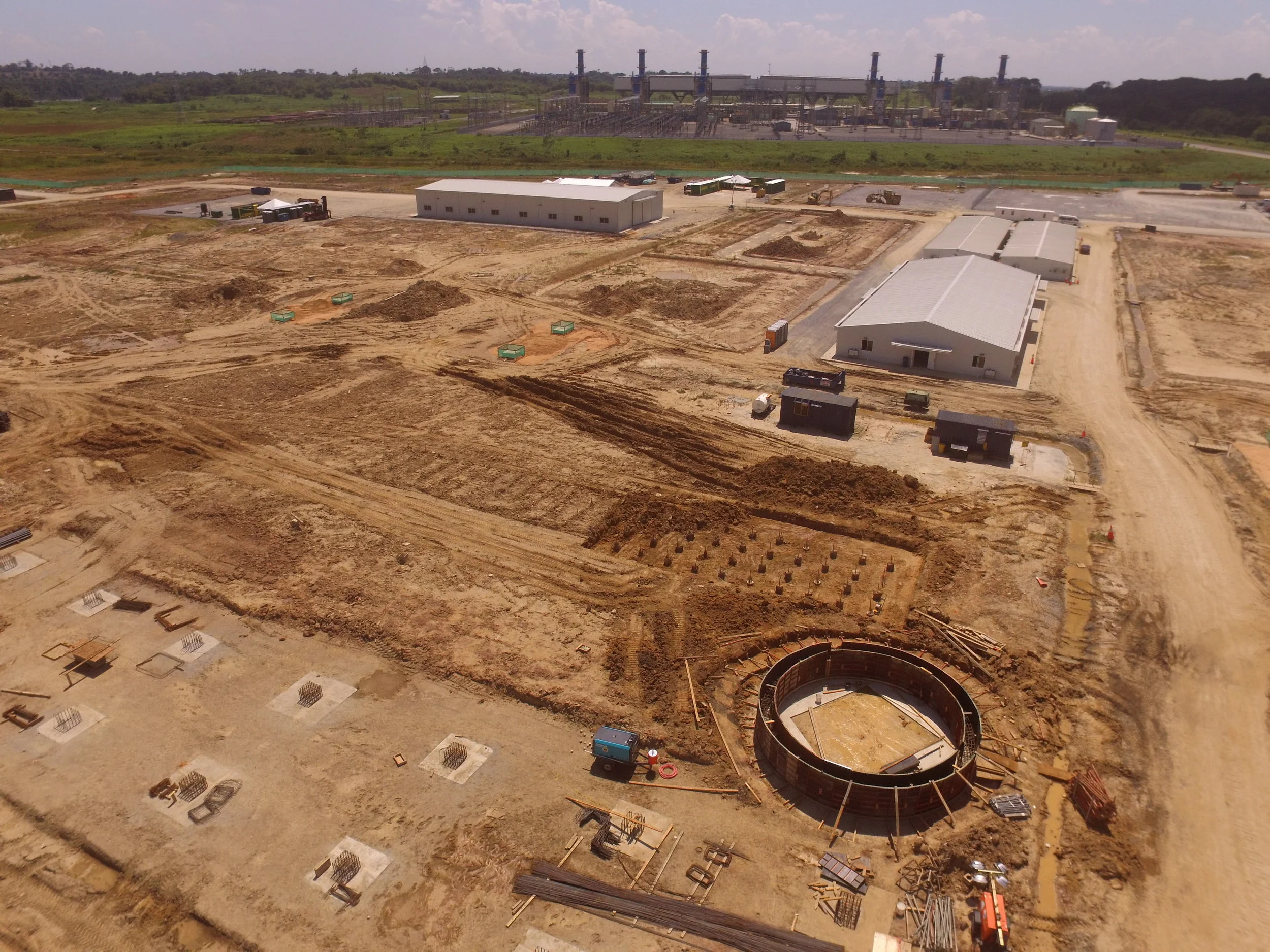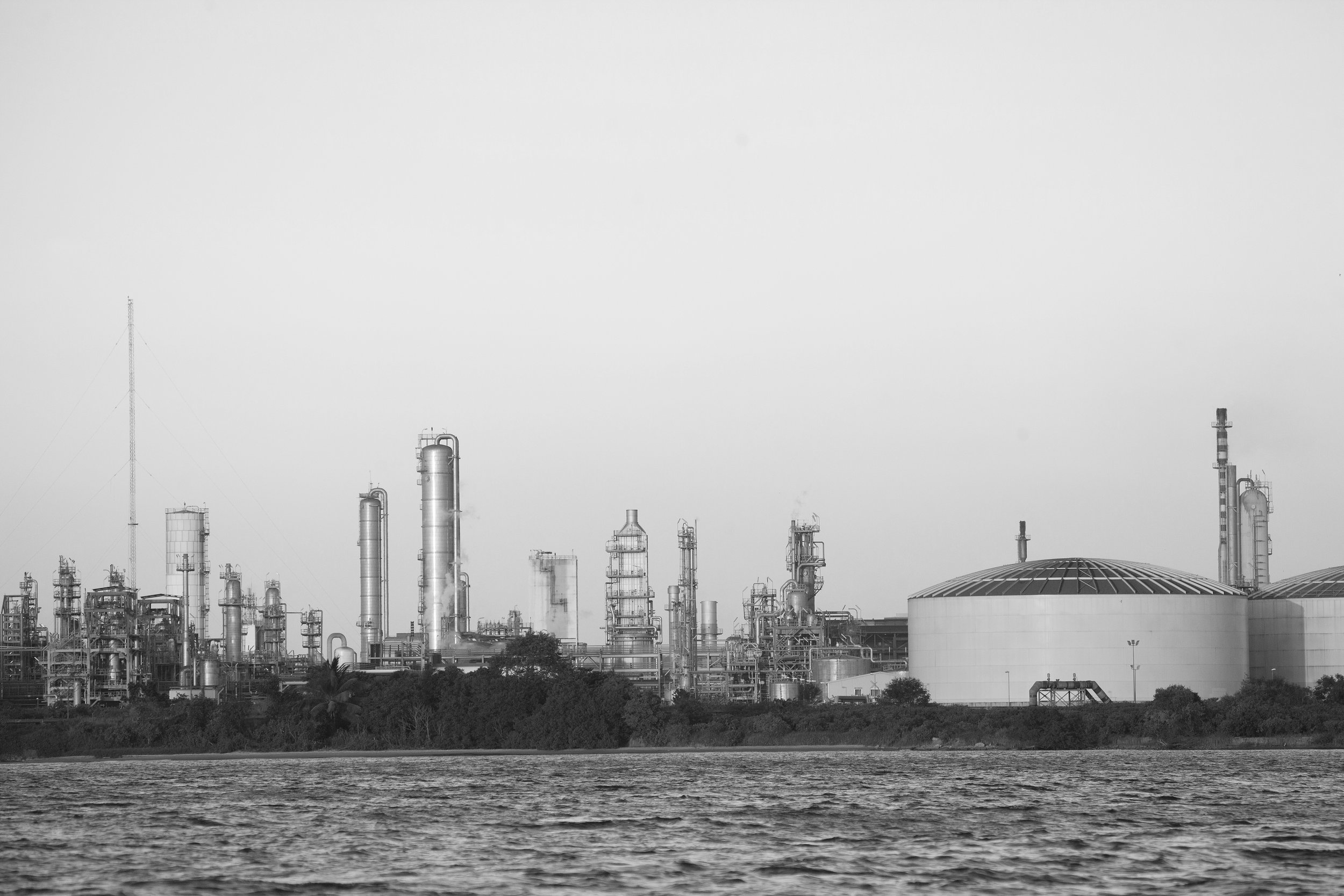Sapurakencana joins several drilling companies that have opted to mothball their vessels off the coast of Trinidad. They are all sitting idly by, waiting for the global energy industry to recover. Cold stacking involves the partial decommissioning of the vessel when it appears that it will not be in use for an extended period of time. Sometimes called mothballing, the main features of the ship are reduced, in order to significantly lessen costs due to the asset being idle.
Construction of the long-delayed Caribbean Gas Chemicals Limited (CGCL) petrochemical facility is underway at the Union Industrial Estate in La Brea, Trinidad. Construction of temporary site facilities for the CGCL plant, which will produce 1,000,000 metric tonnes per year (MTPY) of methanol and 20,000 MTPY of Dimethyl Ether (DME), began in March 2016, but activity on-site only started to ramp up after the final outstanding agreements were ratified and signed by all the stakeholders involved, on August 8th 2016. CGCL is owned by the Mitsubishi Consortium of Japan, the Massy Group and the state-owned National Gas Company of Trinidad and Tobago (NGC). The project is being financed by the Japan Bank for International Cooperation (JBIC).
First gas from the Iguana gas field in the Gulf of Paria is scheduled for the first quarter (Q1) of 2018, according to the Certificate of Environmental Clearance (CEC) application submitted by DeNovo, the operator of Blocks 1(a) and 1(b) off Trinidad’s west coast. Iguana is one of three gas discoveries in the shallow water blocks, which DeNovo purchased from Centrica in April 2016. The CEC application covers the Iguana, Zandolie and Anole fields, and exploration drilling on a fourth prospect named Whiptail.
Interview with Mark Loquan, President, NGC
Over 90% of service companies reported that they were affected by late payments according to a survey of contractors and service companies conducted by the Energy Chamber. In addition, 93% of respondents also said that the impact on their companies was significant and over half of the surveyed companies said that over 50% of their accounts receivables were 60 days overdue.
It is clear that the population of Guyana is now beginning to get more excited about the potential of the oil industry to positively change the country and confidence in the eventual development of the industry has been steadily growing over the past year.
A heated argument is brewing between geologist Herbert (“Billy”) Sukhu and Valerie Stoute, professor of environmental and postgraduate studies and research at the University of Trinidad and Tobago (UTT) over which one has the best approach to monetising the estimated 1.45 billion barrels of 37.5° API oil locked up in tar sands in south Trinidad.
With the three most senior and experienced public servants in the Ministry of Energy due to retire in the next few months, many leaders in Trinidad and Tobago’s energy sector are expressing concerns about a lack of capacity at the Ministry and the likely impact of these changes on key decision making. Permanent Secretaries, Selwyn Lashley and Heidi Wong, and Chief Technical Officer, Richard Jeremie, are all on the verge of retirement from the Ministry.
Jamaica is rapidly converting to natural gas as the main fuel for power generation but, alas, none of it will be coming from Trinidad and Tobago.
In his 2016-17 budget statement, the Trinidad and Tobago Minister of Finance, Colm Imbert, made much of the significant declines in tax revenue that the government has received from the traditional biggest tax-payer, bpTT.
The big disappointment for Guyana, following the discovery of between 800 million to 1.4 billion barrels of oil resources by US major ExxonMobil 200 km offshore, is that the production of crude will not begin for another five years (2021).
While operator companies in the upstream oil sector received welcome news in the national budget statement that their tax burden was likely to be reduced, energy services companies were shocked to learn that their corporation tax rate would jump from 25% to 30% for all taxable profits over TT$1 million.
The government and the energy industry in Trinidad and Tobago does not have the luxury of time if it aims to ensure a sustainable future. We need decisions in the immediate term if we are to deliver a long-term sustainable future for the energy sector.
In his 30th September 2016 budget statement the Trinidad and Tobago Minister of Finance, Colm Imbert, announced that the government was in the process of reviewing the country’s oil and gas taxation regime, using advice from experts from the International Monterary Fund (IMF) to help develop proposals. Minister Imbert summarised the main recommendations from the IMF, which involve the transformation of an existing tax against revenue that kicks in at US$ 50, known as Supplemental Petroleum Tax (SPT), with a new cash flow-based tax and the simplification and reduction of profit taxes. The IMF also recommended “a moderate fixed rate royalty in the order of 10-12%” to ensure a minimum income stream for the government.
Trinidad & Tobago official audited non-associated proved gas reserves declined by 7.8 % between December 2014 and December 2015, down from 11.5 trillion cubic feet to 10.6 (tcf). Unrisked “3P” reserves (that is the total of proved, probable and possible) showed a similar level of decline (8.2%) while overall unrisked exploration resources showed a relatively small decline of just 1.6%, down from 43.8 tcf to 43.1 tcf.
On Wednesday 5th October, 2016, Mr. Mark Loquan, President of the National Gas Company of Trinidad & Tobago Limited, signed the Safe to Work (STOW) Charter, demonstrating the company’s re-commitment to the original objectives of STOW.
After the increase in Green Fund and Business Levy contributions from 0.1% to 0.3% of sales, small gas station owners are complaining about their margins being stifled in the heavily regulated industry. On the face of it, this appears to be negligible but it is the single factor which could lead to the closure of several gas stations. The potential for closure is real because operators are taking home $0.05 cents on every dollar of gas sold.
The fuel industry is regulated and companies that operate within it must do so on fixed margins set by government legislation. The margins under which the industry operates are very narrow and since the 2015 budget increases to the Green Fund and Business Levy, the margins have further eroded, making the industry uncompetitive. In particular, the peddler industry is hurting from the stifled margins which have not been equally adjusted to ensure profitability.
Sovereign wealth funds are relatively new. They have been devised as a defensive measure to address the macroeconomic impact of revenue volatility in resource rich countries. Other objectives include ensuring inter generational equity, addressing future financial needs, and protecting a country’s economy from extraordinary shifts in its fiscal situation.
It was clear that Government Assistance for Tuition Expenses (GATE) had to be restructured. The existing system was wasteful and much of the value went to families who could have afforded to pay university fees — a typical problem with most subsidies. The increase in both the quantity and quality of the cars driven by students and parked on The University of the West Indies (The UWI) St. Augustine campus was testimony to this fact. Means testing is an obvious way of targeting subsidies and a logical policy decision, though I have some misgivings about how the levels have been set and how the process will actually be administered.





















